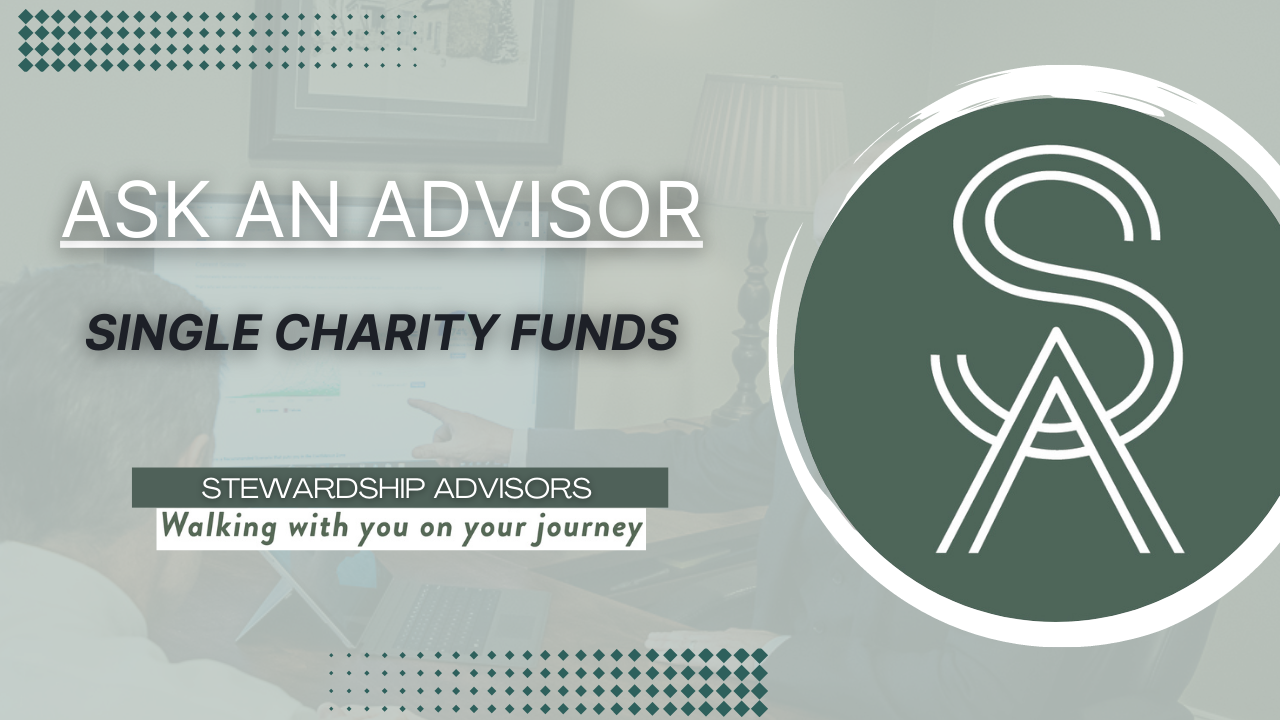Ask An Advisor Series – Single Charity Funds
Please Click Here to have your question featured in the next video
Ask An Advisor Series – Single Charity Funds
Video Transcript
Ben Writer 0:00
Hello there. My name is Ben Writer, with Stewardship Advisors. Today I’m here with Thomas Talbott, and we’re going to be answering your questions about single charity funds. Many of you watching this video, do an amazing job supporting charitable organizations every year. And today, we’d like to introduce a tool that can help you leverage your giving: single charity funds. So Thomas, what is a single charity fund?
Thomas Talbott 0:28
Well, think of it this way. It’s a charitable checkbook for one, 501(c)(3) organization. Donor-advised funds, or DAFs, for short, have become quite popular over the last number of years and there are many similarities that single charity funds have to DAFs: You get a charitable deduction in the year that you fund it with cash or with assets. There’s no mandated schedule, that you have to give the money you can do that in the year the contribution was made, or you can let those assets grow for gifting in the future. They are both low-cost turnkey giving solutions.
Ben Writer 1:14
And if you’d like to learn more about donor-advised funds, there’s a great article on the blog section of our website entitled 8 Things You Should Know About Donor Advised Funds. And we’ll have that linked below. Now, Thomas, you mentioned there are some similarities and differences between donor-advised funds and single charity funds. Could you explain that a little bit more for us?
Thomas Talbott 1:32
With a donor-advised fund, you determine who is going to get the money, when it comes out, and how much. With a single charity fund, you only can take care of the last two, when and how much. All the money that comes out of the single charity fund has to go to a predetermined designated charity. But one of the big unique factors with a single charity fund is that it can be funded with qualified charitable distributions. These are charitable gifting that is done out of an IRA for those that are age 70 and older. The limit right now is $100,000 per year, which may be a great amount to fund one of these single charity funds or multiple charity funds, as Ben has mentioned. So the single charity fund is really the only giving fund that can receive qualified charitable distributions. Unfortunately, a donor-advised fund can’t do that. So Ben, tell us some of the advantages of a single charity fund.
Ben Writer 2:46
Sure. So we’ve heard that sometimes smaller charitable organizations appreciate when their donors give using single charity funds, because the funds come in over a number of years, and that allows those funds to support new and ongoing projects. Also for the donors, it’s a great tool to use when you’d like to preserve the growth of an equity and give for years to come. Now, you may wonder, why would you use a fund where you can only support one charitable organization? In reality, you can open as many single charity funds as you like. So for example, if there are three charitable organizations you’re looking to support, you can open three single charity funds to support those organizations.
Thomas Talbott 3:28
Additionally, you may want to open a single charity fund and invite friends and family to contribute to it to help you with a personal fundraising goal for an organization you all are passionate about. Also, for those of you who are considering moving to a retirement community, the single charity fund can be a powerful tool. So in conclusion, remember two things. One, a single charity fund can only go to one charity. And number two, the funding can be done with qualified charitable distributions, unlike any other fund that is out there.
Ben Writer 4:10
Now, you may be wondering if this giving tool is right for you? If so, please call our office and we’d love to take a look at your specific situation and analyze for charitable giving techniques. Thank you for watching today’s video, and we look forward to answering more of your questions on other topics in our next video.
Links mentioned:
8 Things You Should Know About Donor Advised Funds
Each individual’s or couple’s situation is unique with their own set of circumstances and goals. This information should not be considered investment advice, but rather for educational purposes only. Please speak with your financial advisor if you would like to discuss these options for your situation.
Like this article? Want to learn more about Charitable giving?
Check out our Investment Archives where we’ve compiled helpful tips and tricks to help you plan for your future.
